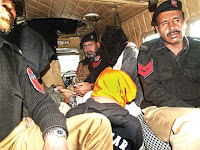LONDON: A US State Department report published last week said that Pakistan was incapable of prosecuting terror suspects, since three in four defendants are acquitted.
According to a report in The Telegraph, in the State Department’s 2010 report, the US criticizes its frontline ally in the war on terror of failing to outlaw militant Islamic terror groups, since they escaped bans by changing names.
The report said that Islamabad had not closed loopholes which allowed terrorist groups and criminals to launder money (hawala), also mentioning former Prime Minister Benazir Bhutto’s unresolved case as an example of how the investigative methods had to improve to collect better evidence, since the post assassination footage clearly showed that the crime scene in Rawalpindi was hosed down before evidence collection.
The report comes amid deteriorating relations between the two countries and continuing anger in India at the slow progress in Pakistan’s prosecution of a number of alleged terrorist leaders charged with plotting the 2008 Mumbai massacre. Six Americans were among the 166 victims.
It further said that while Pakistan maintained it was committed to prosecuting those accused of terrorism, on analysing its Anti-Terrorism Court’s (ATC) rulings last year show that Pakistan’s acquittal rate of prosecuting suspected terrorists was approximately 75%.
The report complains that Pakistan’s ‘weak implementation’ of a UN Security Council resolution which lists banned terrorist organisations remained a concern.
The report was released as a suicide car bomb killed at least 11 people and wounded 22 others celebrating Eid in a Shiite Muslim area of the southwestern Pakistani city of Quetta on Wednesday.
Wikileaks cables released earlier showed that many of the more than 1,000 recently released US embassy cables relating to Pakistan speak of Pakistan’s battle against religious extremism and militancy, and the inability to being suspects to justice.
While some of the cables show concern on the trends observed by US diplomats, others simply relay what was being reported in the Pakistani media without comment.
In recent years, courts have yet to issue a verdict on a terrorism case or have released many terror suspects for lack of evidence, including the controversial Jamaat-ud-Dawa’s Ameer Prof Hafiz Muhammed Saeed.
According to a report in The Telegraph, in the State Department’s 2010 report, the US criticizes its frontline ally in the war on terror of failing to outlaw militant Islamic terror groups, since they escaped bans by changing names.
The report said that Islamabad had not closed loopholes which allowed terrorist groups and criminals to launder money (hawala), also mentioning former Prime Minister Benazir Bhutto’s unresolved case as an example of how the investigative methods had to improve to collect better evidence, since the post assassination footage clearly showed that the crime scene in Rawalpindi was hosed down before evidence collection.
The report comes amid deteriorating relations between the two countries and continuing anger in India at the slow progress in Pakistan’s prosecution of a number of alleged terrorist leaders charged with plotting the 2008 Mumbai massacre. Six Americans were among the 166 victims.
It further said that while Pakistan maintained it was committed to prosecuting those accused of terrorism, on analysing its Anti-Terrorism Court’s (ATC) rulings last year show that Pakistan’s acquittal rate of prosecuting suspected terrorists was approximately 75%.
The report complains that Pakistan’s ‘weak implementation’ of a UN Security Council resolution which lists banned terrorist organisations remained a concern.
The report was released as a suicide car bomb killed at least 11 people and wounded 22 others celebrating Eid in a Shiite Muslim area of the southwestern Pakistani city of Quetta on Wednesday.
Wikileaks cables released earlier showed that many of the more than 1,000 recently released US embassy cables relating to Pakistan speak of Pakistan’s battle against religious extremism and militancy, and the inability to being suspects to justice.
While some of the cables show concern on the trends observed by US diplomats, others simply relay what was being reported in the Pakistani media without comment.
In recent years, courts have yet to issue a verdict on a terrorism case or have released many terror suspects for lack of evidence, including the controversial Jamaat-ud-Dawa’s Ameer Prof Hafiz Muhammed Saeed.

No comments:
Post a Comment